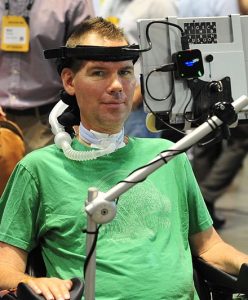
Steve Gleason
U.S. Rep. Cathy McMorris Rodgers (R-WA) is leading the bipartisan and bicameral effort to permanently change a federal policy that limits access to speech generation devices for Medicare-eligible patients with severe disabilities.
Inspired by NFL football star Steve Gleason, who was diagnosed with amyotrophic laterals sclerosis (ALS) in 2011, McMorris Rodgers introduced the Steve Gleason Enduring Voices Act in the House on Monday with support from U.S. Rep. Erik Paulsen (R-MN).
The bill would permanently fix the Centers for Medicare and Medicaid Services (CMS) reimbursement policy that limits access to cutting-edge speech generation devices that people with degenerative diseases need to communicate.
U.S. Sen. Bill Cassidy (R-LA) introduced the legislation in the Senate with U.S. Sen. Amy Klobuchar (D-MN). McMorris Rodgers was joined by U.S. Rep. John Larson (D-CT) in spearheading the measure in the House.
The legislation champions the mission of Gleason, whose non-profit Gleason Initiative Foundation helps provide individuals with neuromuscular diseases or injuries with technology, equipment and services, such as speech generation devices that allow an individual to type through tracking eye movements.
Gleason was a standout on the Washington State University football team who went on to play for the New Orleans Saints for eight seasons before his diagnosis. Gleason and his wife, Michel, founded Team Gleason to raise awareness about ALS, also known as Lou Gehrig’s disease.
“Steve Gleason is a hero and inspiration to all of us, and especially to the thousands of Americans living with degenerative diseases who, like him, rely on speech generating devices to communicate with their family, friends and doctors,” said McMorris Rodgers, who serves as House Republican Chair.
The latest initiative adds to past congressional efforts that have already helped give voice back to people with degenerative disabilities, Paulsen noted. The new bill would build upon the success of The Steve Gleason Act, which was unanimously passed by Congress in 2015 and signed into law by former President Barack Obama.
“Thanks to the continued awareness raised by Steve Gleason and the countless advocates for those with ALS and other degenerative conditions, millions in need will now have permanent access to speech-generation devices, giving them the ability to be heard as well as communicate with loved ones,” Paulsen added.
The silence and isolation that comes with losing the ability to communicate, Gleason said, does not discriminate between different types of injuries, diseases, accidents or conditions.
“Most people who have severe disabilities are expected to fade away quietly and die,” Gleason said. “For me, that was not OK. With the right equipment and the right technology, these same people can live and be productive for decades. I know I speak for all who use this technology in saying — we cannot revert back to the changes that preceded the Steve Gleason Act of 2015.
Cassidy said he was proud to continue the efforts of former U.S. Sen. David Vitter (R-LA), who led the Steve Gleason Act of 2015 with McMorris Rodgers.
“These communication devices open up the world to the thousands living with speech and communication disabilities,” Cassidy said.
Gleason’s mother and the ALS Association first approached McMorris Rodgers about the impact of CMS’s restrictive speech generation device policies in 2014. Soon after that meeting a bipartisan group of more than 200 members of the House and Senate sent a letter to CMS to investigate the agency’s decisions.
“When bureaucratic rules threatened to silence many of them, the Gleason Act gave these individuals the peace of mind to know that their voices will continue to be heard,” McMorris Rodgers said. “The Steve Gleason Enduring Voices Act ensures there are ‘no white flags’ and that access to speech generation devices continues permanently for those who need it most. This is about giving a permanent voice to the voiceless.”



